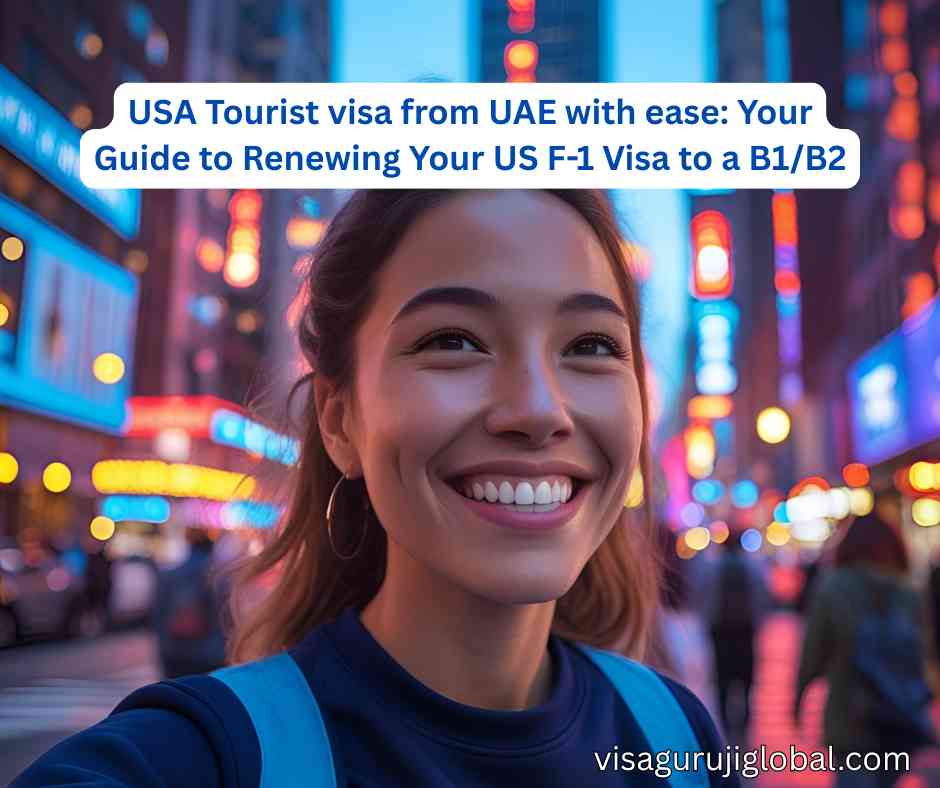
USA Tourist visa from UAE with ease. Are you an international student in the US, nearing the end of your F-1 visa journey? While the F-1 visa opens doors to world-class education, many students find themselves wanting to extend their US stay after student visa for travel, family visits, or business after graduation. But what happens when your studies conclude?
The crucial takeaway: Failing to properly transition from an F-1 student visa to a B1/B2 visitor visa can lead to serious legal complications, including potential bans and penalties for overstaying F1 visa.
As a leading visa service provider in the UAE, we understand your concerns. This comprehensive guide will walk you through everything you need to know about:
- Understanding F-1, B1, and B2 visas.
- Why and when you might need to convert F1 to B1/B2 visa.
- The step-by-step process for both F1 visa renewal process and F1 to B1/B2 visa process.
- Essential documents required for each process.
- Common pitfalls to avoid for a smooth transition.
Let’s dive into the details!
What’s the Difference? F-1 vs. B1/B2 Visas
To navigate your options, it’s vital to understand the distinct purposes of these US non-immigrant visas:
The F-1 Student Visa: Your Academic Passport
The F-1 visa is specifically for international students pursuing academic studies in the United States. It allows you to reside in the US for the duration of your program at:
- Universities or colleges
- High schools
- Private elementary schools
- Seminaries
- Conservatories
- Other academic institutions, including language training programs.
Your F-1 visa’s validity aligns with your program length, from a few months for short courses to several years for degree programs. Upon completion of your studies, you have a 60-day grace period to either depart the US or change visa status US.
Did you know? You can potentially convert your F1 to B1 or B2 visa within four years of your program’s completion. While interviews are sometimes waived, this is at the discretion of the U.S. Consulate.
The B1/B2 Visitor Visa: For Business and Leisure
A B1/B2 visa is a non-immigrant visa designed for temporary visits to the US for either business (B-1) or tourism (B-2). It’s perfect for US visa for tourism after studies or a US business visa after student visa.
To qualify for a B1/B2 visa, you typically need to demonstrate:
- Your visit is genuinely temporary for business or tourism.
- Strong ties to your home country (e.g., job, family, property) that will compel your return.
- Sufficient funds to cover your expenses during your US stay.
- No intent to immigrate to the US.
Specific permissions under each:
- B-1 Business Visa allows for activities like:
- Attending conferences, seminars, or trade shows.
- Negotiating contracts or closing deals.
- Consulting with clients or partners.
- Participating in short-term training programs.
- B-2 Tourist Visa allows for activities like:
- Visiting family or friends.
- Taking a vacation or sightseeing.
- Attending a wedding or other special event.
- Receiving medical treatment.
(For more in-depth information, explore our blog on “How to get a B1 visa from Dubai.”)
Why Convert Your F-1 Visa to a B1/B2?
Imagine completing your studies and wishing to stay in US after F1 to explore, visit family, or attend brief business engagements, rather than immediately leaving or pursuing further education. This is where an F1 to B1/B2 visa conversion becomes essential.
Perhaps your post-graduation plans have shifted. While changing your intentions is perfectly acceptable, it’s vital to be aware of the legal repercussions of overstaying F1 visa consequences.
Failing to properly switch visas can lead to:
- Being deemed an “overstay.”
- Future visa bans.
- Significant fines or other legal actions.
To avoid these complications, it’s crucial to follow the correct legal procedures, typically involving a new visa application and approval from US immigration authorities. Consulting a US visa agent Dubai or a visa agent for US visa in UAE is highly recommended to ensure compliance with US immigration laws.
How to Renew Your F-1 Visa or Convert to a B1/B2 Visa
The processes for renewing your F-1 visa and converting it to a B1/B2 are distinct. Here’s a general overview:
Renewing Your F-1 Visa: Continuing Your Studies
To renew your F-1 visa, you generally need to:
- Maintain Your Student Status: Remain enrolled full-time in an approved academic program and uphold good academic standing.
- Obtain a New Form I-20: Your Designated School Official (DSO) will issue an updated Form I-20 reflecting your continued enrollment.
- Apply for Visa Renewal: Schedule a visa interview at a US consulate or embassy. Gather all necessary documents, including your passport, new I-20, proof of financial support, and academic transcripts.
- Attend the Visa Interview: Be ready to answer questions about your studies, future academic plans, and ties to your home country.
- Await Visa Approval: The consular officer will review your application. If approved, you will receive your renewed F-1 visa.
Converting Your F-1 Visa to a B1/B2 Visa: Post-Study Stay
To transition from an F-1 to a B1/B2 visa, you typically need to:
- Complete Your Studies: Finish your academic program and receive your degree or certificate.
- Apply for a B1/B2 Visa: This often requires applying at a US consulate or embassy outside the US. The interview may be optional if you previously had one scheduled at a US consulate.
- Gather Necessary Documents: This includes your passport, proof of financial support, and a clear letter explaining your temporary stay in US after F1 intent.
- Attend the Visa Interview: Be prepared to discuss your US visit plans, your ties to your home country, and your intention to return.
- Await Visa Approval: The consular officer will make a decision after reviewing your application. If approved, you will receive your B1/B2 visa.
Essential Documents for Both Processes
While specific requirements can vary, here are the commonly needed documents needed for F1 to B2 (and F1 renewal):
For F-1 Visa Renewal:
- Valid Passport: At least six months validity beyond your intended stay.
- New Form I-20: Issued by your DSO, confirming continued enrollment.
- Proof of Financial Support: Documents demonstrating sufficient funds for tuition and living expenses (e.g., bank statements, scholarship awards, sponsor letters).
- Academic Records: Transcripts or other records showing academic progress.
- SEVIS I-901 Fee Receipt: Mandatory for all F-1 visa holders.
- Visa Application Fee Receipt.
For F-1 to B1/B2 Visa Conversion:
- Valid Passport: At least six months validity beyond your intended stay.
- Most Recent Form I-20: Indicating completion of your studies.
- Proof of Financial Support: Documents showing sufficient funds for your temporary US stay.
- Letter of Explanation: Clearly outlining your reason for switching to a B1/B2 visa, such as tourist visa USA after F1 or a business trip USA after F1.
- Ties to Home Country: Documents demonstrating strong ties (e.g., job offer, property ownership, family ties).
- Visa Application Fee Receipt.
Important Considerations for a Smooth Process
- Timing is Key: Apply for the B1/B2 visa before your F-1 visa expires to avoid overstaying.
- Clear Intent: You must unequivocally demonstrate that your US visit is temporary and for business or tourism purposes.
- Strong Home Country Ties: Convince the consular officer you will return to your home country.
- Financial Readiness: Prove you have adequate funds to support yourself during your stay.
- Accuracy & Truthfulness: Provide precise and honest information in your application and during the interview.
- Apply Early: Initiate your B1/B2 application well in advance to prevent last-minute complications.
By diligently following these steps and seeking professional guidance, you can successfully navigate the visa conversion or renewal process and continue your authorized temporary stay in the US.
Common Mistakes to Avoid: Insights from a Visa Expert
As visa experts, we often encounter student concerns about visa rejections. To help you avoid common pitfalls, here are crucial points to remember for both F-1 renewals and F1 to B1/B2 visa transfer processes:
F-1 Visa Renewal Mistakes:
- Neglecting Academic Progress: Failure to maintain good academic standing can jeopardize your F-1 status.
- Ignoring the I-20 Form: Not obtaining a new I-20 from your DSO can significantly delay your renewal.
- Insufficient Financial Support: Failing to provide proof of adequate funds is a common reason for visa denial.
- Overstaying Visa: Exceeding your authorized stay period can lead to severe consequences.
F-1 to B1/B2 Visa Transfer Mistakes:
- Applying Too Late: Delaying the applying for B1/B2 after F1 process can result in overstaying your F-1 visa.
- Lack of Clear Intent: Not clearly articulating your purpose for the B1/B2 visa can raise consular doubts.
- Weak Ties to Home Country: Inadequate evidence of strong ties can hinder your application.
- Insufficient Financial Resources: Failing to prove adequate funds is a frequent cause for denial.
Just keep in mind these to avoid legal issues and ensure a smooth process. If you’re wondering, “Can I change my F1 to B2,” or need assistance with your US visa after graduation, our team is here to help.
Need expert guidance and assistance with your visa renewal or conversion? The Visa Guy is here to help! With our extensive experience and in-depth knowledge of US immigration laws, including specific insights for US visa renewal Dubai for students or F1 to B2 visa application from Dubai, we can guide you through the complex process and significantly enhance your chances of success. We can also provide assistance related to US embassy Abu Dhabi visa renewal and US consulate Dubai visa application procedures.
Frequently Asked Questions (FAQ)
Q: Can I work on a B1/B2 visa? A: No, absolutely not. The B1/B2 visa is strictly for temporary visits for tourism or business purposes. Engaging in any form of employment, including part-time or self-employment, while on a B1/B2 visa is a direct violation of US immigration laws and can lead to serious consequences.
Q: How long does the conversion or renewal process take? A: Processing times for visa applications can vary significantly based on individual circumstances, the workload at the specific consulate, and current visa processing times. It is always advisable to initiate the process well in advance to avoid any last-minute stress. Typically, the entire process, from application submission to visa issuance, can range from several weeks to even a few months.
Q: What happens if my application is denied? A: If your visa application is denied, you will receive a notification explaining the reason for the denial. Common reasons include insufficient documentation, a perceived lack of strong ties to your home country, or concerns about your intent to return. In such cases, you may have the option to reapply after addressing the issues that led to the denial. However, be aware that previous rejections can sometimes impact future visa applications. This answers “What if my F1 to B2 application is denied.”
Q: How long can I stay in the US on a B1/B2 visa? A: The exact duration of your stay on a B1/B2 visa is determined by the US immigration officer at the port of entry. They will assess your specific circumstances, such as your purpose of visit, your planned itinerary, and your ties to your home country. Generally, you may be granted a stay for a few weeks or several months. It is critical to adhere strictly to the specific duration granted by the immigration officer, as overstaying can lead to severe penalties. This addresses “How long can I stay on a B2 visa after F1.”
Q: Can a B1/B2 visa be converted to an F-1 visa? A: No, a B1/B2 visa cannot be directly converted to an F-1 visa while you are in the US. To obtain an F-1 visa, you must typically apply for a new visa and meet all the eligibility requirements, which include acceptance to an accredited academic institution and providing proof of sufficient financial support, usually requiring you to apply from your home country.
